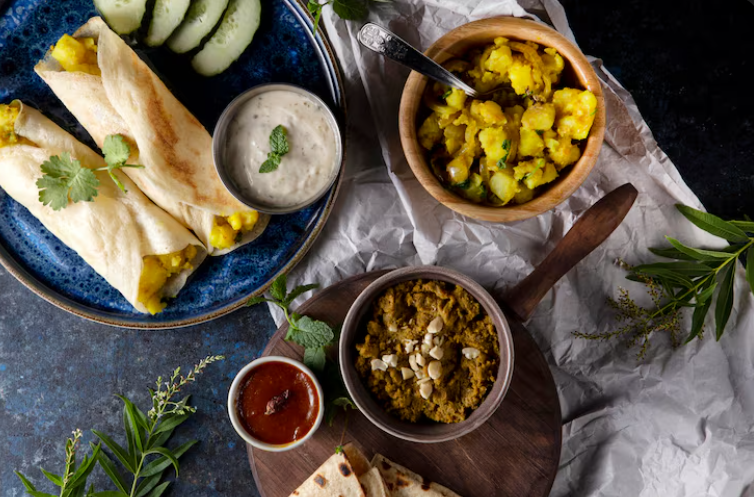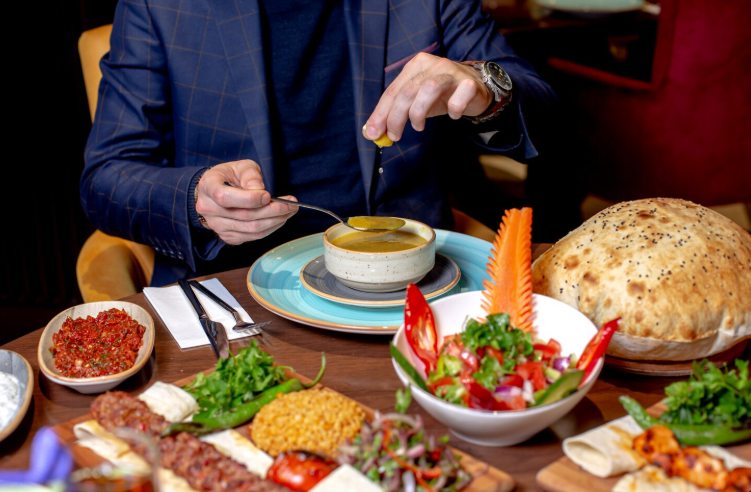
- April 9, 2025
Is South Indian Food Vegan? A Complete Guide to Plant-Based South Indian Cuisine
Is South Indian food vegan? The short answer is yes, for the most part! South Indian cuisine is one of the most naturally plant-based and vegan-friendly food cultures in the world. It heavily relies on lentils, rice, vegetables, coconut, and an array of aromatic spices, making it easy to enjoy South Indian meals without any animal products.
Unlike North Indian cuisine, which often incorporates ghee, paneer, and cream, South Indian food leans towards coconut-based cooking, fermented grains, and dairy-free spices. While some dishes may include ghee or curd, these ingredients can be easily replaced with vegan alternatives, ensuring that you can enjoy traditional flavors without compromising your plant-based diet.
In this article, we will explore vegan-friendly South Indian dishes, common non-vegan ingredients to watch out for, easy swaps for dairy-free Indian meals, a complete vegan meal plan, and tips on where to find authentic South Indian traditional food. By the end, you’ll have everything you need to enjoy the rich flavors of South India while staying completely plant-based!
The Vegan-Friendly Nature of South Indian Cuisine
South Indian food is highly plant-based due to its reliance on naturally vegan ingredients. The cuisine follows Sattvik dietary principles, which emphasize purity, balance, and a deep connection to nature. Many dishes are inherently vegan because they do not require dairy, eggs, or meat.
Unlike many global cuisines that heavily depend on animal products, South Indian cooking revolves around plant-derived staples that offer exceptional flavor and nutrition. The key elements that make South Indian food ideal for vegans include:
- Lentils and Legumes: The foundation of South Indian meals, lentils and pulses such as toor dal, urad dal, and moong dal provide plant-based protein and are used in sambar, rasam, and dal curries. These dishes are naturally vegan and packed with essential amino acids.
- Fermented Foods: Fermentation is a significant part of South Indian cuisine. Idli, dosa, and uttapam are all made from a fermented rice and lentil batter, making them rich in probiotics. This fermentation process improves gut health and enhances nutrient absorption.
- Coconut-Based Cooking: One of the distinguishing features of Famous South Indian food is its extensive use of coconut. Coconut milk, coconut oil, and grated coconut replace dairy in many dishes, adding a creamy texture and a mild sweetness to curries, chutneys, and rice preparations.
- Whole Grains and Rice: South Indians traditionally consume a variety of grains, including red rice, millet, ragi (finger millet), and brown rice. These grains provide fiber, essential minerals, and slow-releasing carbohydrates for sustained energy.
- Spices and Herbs: South Indian food derives its flavors from aromatic spices like mustard seeds, turmeric, cumin, curry leaves, coriander, tamarind, and red chilies. These spices add depth to dishes without the need for dairy-based creams or butters.
Because of these traditional cooking methods, South Indian food is vegan by default in many cases. However, some dishes do contain dairy-based ingredients, which can easily be substituted.
Best Vegan South Indian Dishes
If you are wondering, “Is South Indian food vegan?” you’ll be happy to know that many traditional dishes are already dairy-free and plant-based.
Fermented Delights
- Dosa – A thin, crispy crepe made from fermented rice and lentil batter, served with coconut chutney and sambar.
- Idli – Soft, steamed rice cakes that are light, fluffy, and often paired with spicy chutneys.
- Neer Dosa – A delicate, thin rice crepe that is gluten-free and dairy-free.
- Uttapam – A thicker, pancake-like dosa topped with onions, tomatoes, and green chilies.
Lentil-Based Dishes
- Sambar – A thick lentil stew cooked with tamarind, vegetables, and spices.
- Rasam – A tangy, spicy soup made from tamarind, tomatoes, and black pepper, often enjoyed as a digestive aid.
- Parippu Vada – Deep-fried lentil fritters that are crispy on the outside and soft inside.
Rice-Based Specialties
- Bisi Bele Bath – A spiced lentil and rice dish, naturally dairy-free when made with coconut oil instead of ghee.
- Puliyogare – Tamarind rice infused with spices and topped with crunchy peanuts.
- Coconut Rice – A fragrant dish where cooked rice is sautéed with coconut, green chilies, and curry leaves.
Vegetable Curries
- Avial – A mixed vegetable stew cooked in coconut and mildly spiced. Traditionally contains yogurt, but can be made with coconut yogurt.
- Puli Kulambu – A spicy tamarind-based vegetable curry that is naturally vegan.
- Poriyal – A dry vegetable stir-fry, usually made with beans, carrots, or cabbage.
Traditional South Indian Snacks
- Murukku – A crispy, spiral-shaped snack made from rice flour and lentil flour.
- Paniyaram – Small, savory dumplings cooked in a special pan, often served with chutney.
- Banana Chips – Thinly sliced and deep-fried banana crisps, often enjoyed as a snack.
These plant-based South Indian dishes are nutritious, flavorful, and completely dairy-free. However, it is essential to be aware of certain non-vegan ingredients found in some traditional recipes.
How to Make South Indian Food Vegan-Friendly
Although South Indian food is vegan in many ways, some traditional dishes may contain small amounts of dairy. To make South Indian cuisine 100% vegan, here are some simple ingredient swaps:
- Replace Ghee with Coconut Oil or Vegan Butter – Many South Indian recipes use ghee, but coconut oil is a perfect substitute.
- Use Plant-Based Yogurt for Curd Rice – Curd rice is a staple, and it can be made using cashew or coconut yogurt instead of dairy-based curd.
- Choose Dairy-Free Sweets – Traditional sweets like Mysore Pak and payasam contain ghee and milk but can be made using vegan-friendly versions with almond or oat milk.
- Ask for No Butter or Ghee in Restaurants – When dining out, request dishes without butter or ghee to ensure they remain vegan.
By making these simple adjustments, you can enjoy all the authentic flavors of South India while keeping your meals completely plant-based.
Where to Enjoy Authentic Vegan South Indian Food
If you want to experience vegan South Indian food, you can:
- Cook at home using traditional recipes with plant-based swaps.
- Look for vegan-friendly Indian restaurants that offer dairy-free meals.
- Visit Mysore Aduge, a restaurant dedicated to authentic South Indian vegetarian food!
Mysore Aduge specializes in traditional South Indian cuisine, crafted with local ingredients and authentic flavors. Whether you are looking for classic dishes or vegan-friendly adaptations, Mysore Aduge offers a true taste of South India’s rich culinary heritage.
Conclusion
Is South Indian food vegan? Yes, in many ways! With its reliance on plant-based ingredients, traditional cooking methods, and dairy-free alternatives, South Indian cuisine is one of the best choices for vegans.
If you’re craving authentic South Indian flavors, Mysore Aduge is the perfect place to explore a rich variety of vegan-friendly South Indian dishes. Try it today and experience the delicious world of plant-based South Indian food!
Frequently Asked Questions
Not all South Indian food is vegan, but most of it is naturally plant-based. Dairy-based ingredients like ghee and curd can be easily replaced with vegan alternatives.
Some of the best vegan South Indian dishes include dosa, idli, sambar, rasam, puliyogare, coconut rice, and poriyal.
Use coconut oil instead of ghee, plant-based yogurt for curd rice, and non-dairy milk for desserts to ensure your South Indian meals remain vegan.
Yes, but it’s best to ask if the food contains ghee, butter, or curd. Many South Indian restaurants offer vegan-friendly options or can make substitutions.
Watch out for ghee, curd, and milk-based sweets. These can be replaced with coconut oil, plant-based yogurt, and almond or oat milk.
Most traditional South Indian sweets contain dairy, but they can be made vegan-friendly using plant-based milk and coconut oil.
Traditional South Indian filter coffee is made with milk, but you can request it with almond, coconut, or soy milk for a vegan version.
You can cook at home, find vegan-friendly restaurants, or visit Mysore Aduge for a true South Indian culinary experience.








